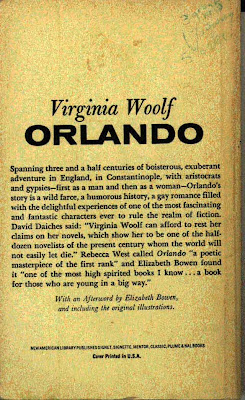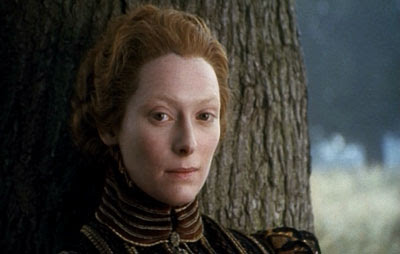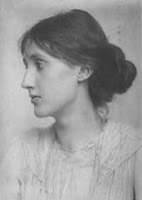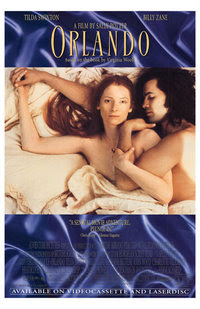Virginia Woolf (January 25, 1882 – March 28, 1941) was an English novelist and essayist regarded as one of the foremost modernist literary figures of the twentieth century.
During the interwar period, Woolf was a significant figure in London literary society and a member of the Bloomsbury Group. Her most famous works include the novels Mrs Dalloway (1925), To the Lighthouse (1927), and Orlando (1928), and the book-length essay A Room of One's Own (1929) with its famous dictum, "a woman must have money and a room of her own if she is to write fiction".
Novel
Orlando is generally considered one of the most "accessible" novels by Virginia Woolf, and is one of the most influential books written by a female author, mixing fiction with biography. Eventually, a project on the history of women's writing in the British Isles was named after the book.
It is the story of a young man named Orlando, born in England during the reign of Elizabeth I, who decides not to grow old. He does not, and he passes through the ages as a young man ... until he wakes up one morning to find that he has metamorphosed into a woman -- the same person, with the same personality and intellect, but in a woman's body. The remaining centuries up to the time the book was written are seen through a woman's eyes.
Apart from being, at the beginning of the book, a knightly young man, ready for adventure, Woolf's Orlando takes little from the eponymous legendary hero of the Italian Renaissance.
Orlando can be read as a roman à clef: the characters Orlando and Princess Sasha in the novel refer to Vita Sackville-West and Violet Trefusis respectively (see: 2nd section of "Violet Trefusis" article). The photographs printed in the illustrated editions of the text are all of the real Vita Sackville-West. Her husband, Harold Nicolson, appears in the novel as Marmaduke Bonthrop Shelmerdine. "The Oak Tree", the poem written by Orlando in the novel, refers to the poem "The Land", for which Vita had won the Hawthornden Prize in 1927.
Princess Sasha in the novel refer to Vita Sackville-West and Violet Trefusis respectively (see: 2nd section of "Violet Trefusis" article). The photographs printed in the illustrated editions of the text are all of the real Vita Sackville-West. Her husband, Harold Nicolson, appears in the novel as Marmaduke Bonthrop Shelmerdine. "The Oak Tree", the poem written by Orlando in the novel, refers to the poem "The Land", for which Vita had won the Hawthornden Prize in 1927.
For historical details Woolf draws extensively from Knole and the Sackvilles, a book written (and reworked in several versions) by Vita, describing the historic backgrounds of her ancestral home, Knole House in Kent. Other historical details derive from John Dryden's Essay of Dramatick Poesie. (Orlando, personified as one of Vita's ancestors - the 6th Earl of Dorset - discusses artistic topics with his contemporaries as described in that book.) Orlando is also an attractive version of a history book on the Sackvilles' noble descendants, their estates, their culture, etc; Woolf was middle-class and fascinated by the aristocracy, as embodied in Vita. (Vita also wrote about these subjects, but Woolf thought Vita had a "pen of brass").
The conventions of fiction and fantasy (e.g., fictional names and a main character who lives through many centuries) allowed Woolf to write a well-documented biography of a person living in her own age, without opening herself to criticism about controversial topics such as lesbian love. While Orlando was published in the same year as The Well of Loneliness, a novel banned in the UK for its lesbian theme, it escaped censorship because the main character appears as a man when he loves Princess Sasha.
Vita's mother was not pleased at the writing of the novel, because she believed the story was too plain in its meaning, and she would call Woolf the "virgin wolf" henceforth. Violet Trefusis's reply would be a more conventional roman à clef (Broderie Anglaise), which loses much of its interest if the reader does not know the background, whereas Orlando remains a captivating novel, even if the reader does not know the identity of the person in the photographs in the book.
Orlando: A Biography was described as an elaborate love letter from Virginia Woolf to Vita Sackville-West (by the latter's son Nigel Nicolson); nonetheless, Woolf intended her novel as the first in a new trend, breaking the boundaries between what are traditionally seen as the fiction and non-fiction genres in literature (so the novel is not only about trans-gender, but also trans-genre, so to speak). This was not to be, however, as the book is invariably called a "novel" (while Woolf called it a "biography"), and is shelved in the "fiction" section of libraries and bookshops. Only in the last decades of the 20th century would authors again try this "tricky" cross-over genre (which differs from "romanticised" or "popularised" non-fiction, and does not necessarily have to take a roman à clef form) , e.g., Flaubert's Parrot by Julian Barnes (ISBN 0-330-28976-4).
Orlando is a 1992 film, based on Virginia Woolf's novel Orlando: A Biography, starring Tilda Swinton as Orlando, Billy Zane as Marmaduke Bonthrop Shelmerdine, and Quentin Crisp as Queen Elizabeth. It was directed by Sally Potter. Actor Toby Stephens, son of Maggie Smith, appears as an Elizabethan actor playing the role of Othello. Queer icon Jimmy Somerville provides some of the music.
The film was shot on a small budget in ten weeks with a week for pickups and reshoots.
It was particularly acclaimed for its visual treatment of the settings of Woolf's 1928 novel. Potter chose to film much of the Constantinople portion of the book in the isolated city of Khiva in Uzbekistan, and made use of the forest of carved columns in the city's 18th century Juma mosque.
The film goes beyond the novel in that it brings Orlando's life into the early 1990s.
Orlando was nominated for Academy Awards for art direction and costume design. (from Wikipedia)
Critic Roger Ebert reviewed the movie "This is the kind of movie you want to talk about afterward."
BY ROGER EBERT / July 9, 1993, Chicago Sun Times
"Orlando" is about a person who achieves in one lifetime what most of us can only dream of doing: viewing four centuries of experiences through the eyes of both sexes. Obviously it is a very long and unusual lifetime. Born as a man in the time of Elizabeth I, Orlando becomes a woman midway in the journey ("You see? Absolutely no difference!") and is still going strong as the film ends. This is the kind of movie you want to talk about afterward. Directed with sly grace and quiet elegance by Sally Potter, it is not about a story or a plot, but about a vision of human existence. What does it mean to be born as a woman, or a man? To be born at one time instead of another? To be born into wealth, or into poverty, or into the traditions of a particular nation? Most of us will never know. We are stuck with ourselves, and as long as we live, will always see through the same eyes and interpret with the same sensibility. Yes, we can learn and develop, but so much of what makes us ourselves is implanted at an early age, and won't budge. "Orlando" is inspired by the novel by Virginia Woolf, herself a writ er who tried to break free of sex and class restraints. Stanley Kauffmann writes in the New Republic that the novel was originally written for, and inspired by, Vita Sackville-West, said to be one of Woolf's lovers. It comes out of that pre-Beauvoir time in the earlier 20th century when society still regarded women as second-class citizens, not fit to vote, but when many women were energetically assaulting society's quaint notions as quickly as they could. Orlando, the omnisexual hero-heroine of the story, is played throughout by Tilda Swinton, who is definitely a woman and not particularly androgynous; her obvious femininity is explained in an early scene by a reference to the male fops and dandies of Elizabeth's reign, who in their fashions and vanities outdid their women. Orlando, as a man, owns an estate with a great home on it, and is told during a visit by the queen that he can keep it forever - but only if he always remains young, fresh and ageless. So, he does. (In a bow to the film's underlying theme, Elizabeth is played by Quentin Crisp, the octogenarian who wrote a famous book, The Naked Civil Servant, about his long years of shocking the British with his flamboyant homosexuality.) Orlando drifts dreamily and bemused from one era to the next. The film skips ahead in leaps of about 50 years, as Orlando tries various careers (a stint as an ambassador in the Middle East is particularly educational) and relationships. There is a hitch when he becomes a she; as a woman, Orlando is informed by the authorities, she can no longer legally own her great estate (only men could then hold the title to property). If this were not bad enough, they explain, there is another hitch: Having lived by then more than 200 years, she must be presumed dead. No matter. Life is perhaps simpler without the bother of property, and in modern times Orlando has a loving relationship with a modern man (Billy Zane) and samples a more bourgeoise lifestyle. If Tilda Swinton had attempted to react to every turn and event in Orlando's life - to actively participate in everything - the movie might have grown tiresome. But her detachment, and what can only be called her sweetness, provides the proper tone for the material. Given the gift of eternal youth, Orlando is able to temper it with the no less valuable gift of grateful bemusement."
er who tried to break free of sex and class restraints. Stanley Kauffmann writes in the New Republic that the novel was originally written for, and inspired by, Vita Sackville-West, said to be one of Woolf's lovers. It comes out of that pre-Beauvoir time in the earlier 20th century when society still regarded women as second-class citizens, not fit to vote, but when many women were energetically assaulting society's quaint notions as quickly as they could. Orlando, the omnisexual hero-heroine of the story, is played throughout by Tilda Swinton, who is definitely a woman and not particularly androgynous; her obvious femininity is explained in an early scene by a reference to the male fops and dandies of Elizabeth's reign, who in their fashions and vanities outdid their women. Orlando, as a man, owns an estate with a great home on it, and is told during a visit by the queen that he can keep it forever - but only if he always remains young, fresh and ageless. So, he does. (In a bow to the film's underlying theme, Elizabeth is played by Quentin Crisp, the octogenarian who wrote a famous book, The Naked Civil Servant, about his long years of shocking the British with his flamboyant homosexuality.) Orlando drifts dreamily and bemused from one era to the next. The film skips ahead in leaps of about 50 years, as Orlando tries various careers (a stint as an ambassador in the Middle East is particularly educational) and relationships. There is a hitch when he becomes a she; as a woman, Orlando is informed by the authorities, she can no longer legally own her great estate (only men could then hold the title to property). If this were not bad enough, they explain, there is another hitch: Having lived by then more than 200 years, she must be presumed dead. No matter. Life is perhaps simpler without the bother of property, and in modern times Orlando has a loving relationship with a modern man (Billy Zane) and samples a more bourgeoise lifestyle. If Tilda Swinton had attempted to react to every turn and event in Orlando's life - to actively participate in everything - the movie might have grown tiresome. But her detachment, and what can only be called her sweetness, provides the proper tone for the material. Given the gift of eternal youth, Orlando is able to temper it with the no less valuable gift of grateful bemusement."


No comments:
Post a Comment